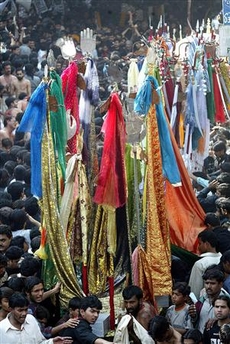|
Suicide blast, clashes in Pakistan kill 22
(AP)
Updated: 2006-02-09 19:15
A suicide bombing ripped through a Shiite procession
Thursday in northwestern Pakistan, sparking riots during the Muslim sect's most
important holiday. At least 22 people were killed and dozens injured, officials
said.

Pakistani Shi'ite Muslims carry religious flags during
Moharram procession in the eastern city of Lahore February 8, 2006.
[Reuters] |
The bomb targeted hundreds of people in a bazaar soon after they emerged from
the main Shiite mosque in the town of Hangu, district police chief Ayub Khan
said.
The Shiites responded by burning shops and cars while clashing with police in
the town, located about 125 miles southwest of the capital, Islamabad, Khan
said. Army troops moved in to restore order and a curfew was imposed, he said.
Ghani ur-Rehman, the top district administrator, said 22 people were reported
killed and more than 50 wounded. He said more than 60 percent of the town bazaar
had burned in the violence that following the bombing.
A security official, speaking on condition of anonymity because he wasn't
authorized to speak to the media, said some of the fatalities came during gun
fights between battling factions in the town after the attack.
Akram Durrani, the top elected official in the province, said a preliminary
investigation showed the bomb was a suicide attack. He immediately announced a
judicial inquiry into the incident.
The attack took place at the height of the Ashoura holiday, which marks the
7th century death of Imam Hussein, a grandson of the Prophet Muhammad. Hussein's
death led to a rivalry between Shiites and Sunnis over who should succeed the
prophet.
Security was tight for the holiday because it has been marred by violence in
recent years. Sunni Muslims — the majority in Pakistan — have been blamed for
attacking Shiites during the event, which involves religious processions across
the country.
After the attack Thursday, police mounted road blocks on the road to Hangu.
An Associated Press reporter was barred from passing beyond Ustarzai, a town
about 15 miles from the scene. Police even blocked three ambulances.
Mir Faisal, a local government chief in Hangu, said smoke was hanging over
the town because of fires in the bazaar and he could hear gunfire. He said army
and paramilitary troops had arrived but it was still too dangerous for any
officials to go outside.
Hangu Mayor Ghani Ur-Rahman, however, said the situation was under control by
early afternoon. He said Sunni and Shiite leaders were helping to calm the
situation.
Clerics from both sects used mosque loudspeakers to urge their followers to
avoid further violence, which many feared could spread to other processions
across Pakistan.
A prominent Shiite cleric, Allama Mehdi Najfi, in the southwestern city of
Quetta told the AP: "This attack has spread anger among our people throughout
the country, but I appeal them not to clash with any member of other sects."
Information Minister Sheikh Rashid Ahmed condemned the attack.
"This is a conspiracy to trigger clashes between Sunnis and Shiites. No
Muslim can do this thing. Whoever has done this thing is a terrorist," he said.
Top officials of the North West Frontier Province held an emergency meeting
in the northwestern city of Peshawar to discuss how to control the situation, a
provincial official said on condition of anonymity because he wasn't authorized
to disclose it.
Durrani announced the government would pay more than $1,500 to the families
of each of the dead.
Sectarian attacks have plagued this Islamic nation for years.
Last March, 46 pilgrims died in the bombing of a Shiite shrine in the
southwestern town of Fatehpur. In March 2004, Sunni militants launched a suicide
attack on an Ashoura procession of Shiites in the regional capital of Quetta,
killing 44 people.
|